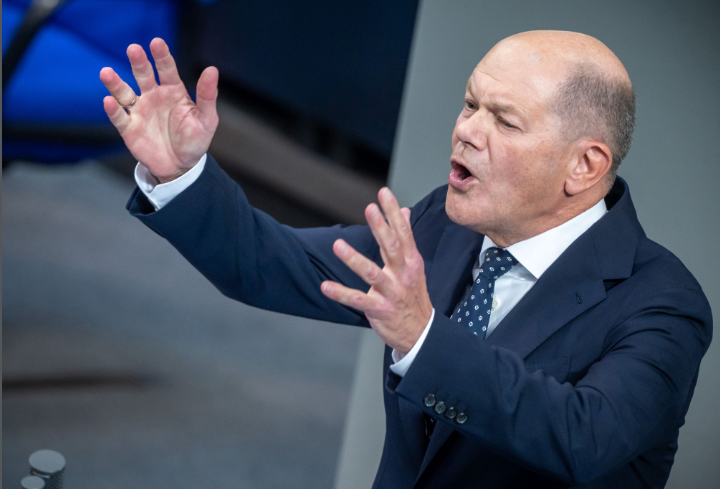German Chancellor Olaf Scholz plans to address extensive problems facing German industry with a summit in the Chancellery later this month, he announced in remarks to parliament on Wednesday.
A report by the German News Service (delivered by dpa) quotes Scholz as saying: “I will invite company representatives, industrial trade unions and industrial associations to a meeting in the Chancellery this month, where they will all come together and we will discuss precisely those things that are necessary,” he said in a government statement ahead of the upcoming EU summit in Brussels. I will propose to this parliament that we also initiate what comes out of it so that things can move forward in Germany.”
Speaking to lawmakers on the political sparring ahead of the 2025 election in the Bundestag, Germany’s lower house of parliament, Scholz also sought to attack opposition leader Friedrich Merz of the centre-right Christian Democrats (CDU).
Merz is widely expected to be Scholz’s top challenger for the post of chancellor in the next nationwide election, scheduled for September 2025.
Scholz on Wednesday accused Merz of lacking respect for regular working people in Germany with attacks on work ethic and the economy in the country. Scholz contended that working people have been helped most by his coalition government’s policies.
“By the way, respect for those who work does not mean calling them all lazy every morning, as has apparently become the fashion in the CDU,” Scholz said, adding: “Mr. Merz cannot even get out of bed without saying: ‘Not enough work is being done here.”
Responding, Merz accused Scholz of misusing the parliamentary lectern for election campaigning. Instead of a government statement on the EU summit, lawmakers heard a “premature, almost desperate election campaign speech” from a chancellor who has “his back to the wall” and his feet dangling over the abyss.
Above all, Merz criticized Scholz for not having said a word about migration. Merz and other German conservatives have demanded a crackdown on immigration into the country.
On making industrial policy a focus, he noted that the debate in Berlin comes ahead of the EU summit, which is due to take place in Brussels on Thursday and Friday.
The topics at the summit are expected to include migration, Russia’s ongoing invasion of Ukraine, the war in the Middle East and the international economic competitiveness of the EU. Economic issues were a particular focus of Scholz’s comments on Wednesday.
Germany is an industrialized country and has not succumbed to the “temptation of many others who have said that industry can be written off, financial centers are the only thing you need,” the chancellor said.
“That is why we must now fight together with industry, on which millions of jobs depend, to preserve this foundation of our prosperity,” he added.
In addition to what his coalition government has already proposed, Scholz on Wednesday said he is in favour of “agreeing on a new industrial policy agenda that benefits everyone.”
Read Also: Gov Zulum expresses shock over deadly Jigawa Tanker explosion, offers condolences
This should not be announced from a lectern before parliament in the capital of Berlin, “but should be something that we fight for and work on together,” he said.
Also speaking on weapons for Israel and peace with Russian President Vladimir Putin, the German Chancellor also pledged to keep German-made weapons flowing to Israel, which is waging military offensives in both the Gaza Strip and Lebanon.
Israel has come under sharp international criticism over extensive civilian deaths and an unfolding humanitarian catastrophe in Gaza.
But Germany, where leaders say its close alliance with Israel is tied to Germany’s historical responsibility for the murder of millions of Jews in the Holocaust, has remained a steadfast supporter.
Scholz, however, again signaled his willingness to talk with Russian President Vladimir Putin about a peace deal to end the ongoing Russian invasion of Ukraine.
He noted that Ukrainian President Volodymyr Zelensky has called for another peace conference with the participation of Putin.
He contended that he is following clear principles in urging talks with Russia.
There would never be any decisions “over the heads of Ukraine and never without coordination with (Germany’s) closest partners,” he said.
At the same time, the chancellor said that countless Russian soldiers were also “victims of the Russian president’s imperialist madness” every day, adding: “They too are victims of his policy aimed at enlarging his country. Something that must not happen again in Europe in this way.”






